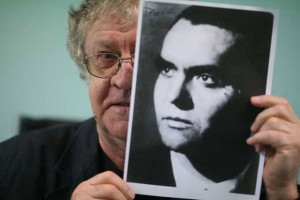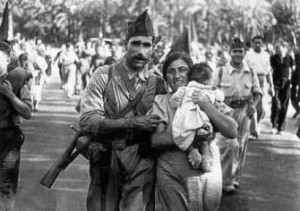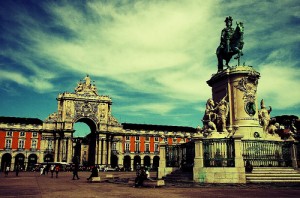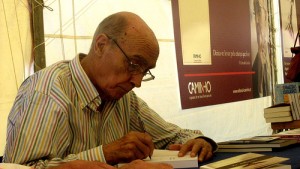Portugal is the guest country at the International Book Fair in Bogotá (also known as FILBo), which opens this month, reflecting an upsurge in interest in Portuguese-language literature. José Luís Peixoto and Inês Pedrosa, both young Portuguese authors, are among the 23 writers who will feature at the Colombian event. Works by legendary figures such as Fernando Pessoa, Luís Vaz de Camões and Eça de Queirós will also feature, as well as that of the more contemporary José Saramago and António Lobo Antunes. According to Público newspaper, over 30,000 books will be available within a 3,000-square-meter pavilion. Exhibits include Lisbon Ground, first shown at the Venice Biennale of … [Read more...] about Portugal stakes a claim at Colombian book fair
Books
A new take on the American abroad
Young American poet Adam Gordon is a fraud and a bastard. And the fact he’s spending a year in Madrid, as the recipient of a prestigious fellowship, is thanks to total pretence. Officially, he’s in the Spanish capital to write a “long and research-driven poem… about the literary response to the Civil War.” But Adam intends doing no such thing (thank god). Instead he smokes pot, takes prescription drugs, forms wafer-thin relationships and frets constantly about the validity of his experiences. If that narrative risks coming off as trite, then Leaving the Atocha Station, by American poet Ben Lerner (who spent a year in Madrid as a Fulbright scholar), is far from it. The book, which is thin … [Read more...] about A new take on the American abroad
Spain’s literary giants are lost in English translation
An indisputable criterion of success for any novelist is when Penguin Modern Classics signs up your backlist, especially when it’s for a five-figure sum. Which is what has happened to Javier Marías. The 60-year-old Spanish writer, whose latest title, The Infatuations (Los enamoramientos), will be published in English in early 2013, joins an exclusive group of Spanish writers in Penguin’s catalogue: Cervantes, Quevedo, Jacinto Benavente, and Lorca. Yes, that’s it. Four writers: the first two of whom died in the 17th century, the next in 1954; although he stopped writing long before that. For Penguin, and most US and UK publishers, it seems that, until now, Spanish literature ended with the … [Read more...] about Spain’s literary giants are lost in English translation
Gibson’s undimmed passion for Lorca
I first met Ian Gibson in 2004. While walking through the Madrid barrio of Lavapiés, I had spotted a face that I remembered from the book flap of his biography of Federico García Lorca. Like a weak-kneed groupie, I followed him into a bar and confessed I was a fan of the biography as well as his exploration of the events that led up to Lorca’s death, El asesinato de García Lorca. Gibson, who lived in the area, graciously invited me to sit down and have a drink and I spent 10 hurried minutes with him. Seven years on, I meet Gibson at the same bar (his choice), but this time the interview has been arranged by phone and it coincides with a new edition of his Lorca biography in Spanish, … [Read more...] about Gibson’s undimmed passion for Lorca
Revisiting Laurie Lee’s Spain
The vista below me spread from Ronda to the Rif, a classical arrangement of sea and rock, with the mouth of the Mediterranean pierced by the wash of ships tracing a course as old as Homer. Kites and kestrels swung silently overhead, smouldering in the evening sun; and twilight approached, the pillars of Hercules turned purple and the sea poured between them in a flush of lavender. Alone, with my back to a sun-warmed rock, I finished the last of my food, gazing where Africa and Europe touched fingertips in this merging of day and night. It is over three-quarters of a century since a young Laurie Lee disembarked at the Galician city of Vigo, having crossed the Bay of Biscay, with a violin … [Read more...] about Revisiting Laurie Lee’s Spain
A literary trip through Toledo’s historical labyrinth
Even before I moved to Spain, and particularly before I started reading about Spain, I was fascinated by the clash between the idea of Catholic Spain and the other peoples, cultures and faiths who've lived here. The more I travelled around the country, and the more books I read, these others – particularly Moors and Jews – emerged as not just temporary alien visitors, but an enduring presence through the centuries. A plan formed, slowly, to visit Toledo, bringing these books along as guides, to see how this story of Spain might be written into the buildings of one of the country's most famously Catholic cities, a place described by Jan Morris as the “repository of all that is proudest, … [Read more...] about A literary trip through Toledo’s historical labyrinth
The Spanish holocaust
Even to this day, when asked about the slaughter and repression carried about by General Francisco Franco during the Spanish Civil War and in the years that followed, the standard reply from many Spaniards is that atrocities were committed on both sides. But in this relentlessly harrowing read, British historian Paul Preston provides, page after page, factual, documentary accounts of the systematic policy introduced by Franco early on in the war to rid the country of the red menace and to install a reign of terror among the few that might still contemplate resistance. This was accomplished through disappearances, and in many cases, the murders of entire families, along with theft of young … [Read more...] about The Spanish holocaust
Sábato, Argentina’s contradictory literary giant
Ernesto Sábato, who died on April 30 at the age of 99, was, as Voltaire said of all great men and women, a mass of contradictions. And therein lies the strength of the Argentine’s writing: he always wrote what he understood to be true, according to his often contradictory experiences. He was chosen to head the committee (CONADEP) tasked with investigating the "disappearances" of thousands of people during Argentina’s dictatorship, yet had initially supported the military when it took over in 1976 at a time of mounting economic problems, social turmoil, and clashes with leftist guerrillas who carried out kidnappings and killings. He had joined other writers in a meeting with dictator … [Read more...] about Sábato, Argentina’s contradictory literary giant
Portugal’s history echoes down the ages
Portugal has been a regular feature in international news headlines lately. Sadly, though, it is usually mentioned for the wrong reasons, such as worries about its ability to manage its chaotic finances and finance its debt. This glut of attention contrasts with the near invisibility Portugal has maintained for much of the last few decades on the international stage, with few figures other than its footballers and the occasional writer making an impact beyond its own borders. In The Portuguese: A Modern History, Barry Hatton explores both the reasons for the country’s see-sawing international profile and the roots of its more recent economic woes. A Lisbon-based journalist who has … [Read more...] about Portugal’s history echoes down the ages
Saramago: Iberia’s Godless conscience
“With a rapid movement, what was in sight has disappeared behind the man’s clenched fists, as if he were still trying to retain inside his mind the final image captured, a round red light at the traffic lights. I am blind, I am blind, he repeated in despair as they helped him to get out of the car, and the tears welling up made those eyes which he claimed were dead, shine even more.” (From Blindness). Given that his life was so often filled with polemic, perhaps it was fitting that José Saramago’s death should be surrounded by controversy. The late Portuguese novelist would have smiled from the afterlife –if he had believed in it– at the idea of the Vatican and his country’s president … [Read more...] about Saramago: Iberia’s Godless conscience









